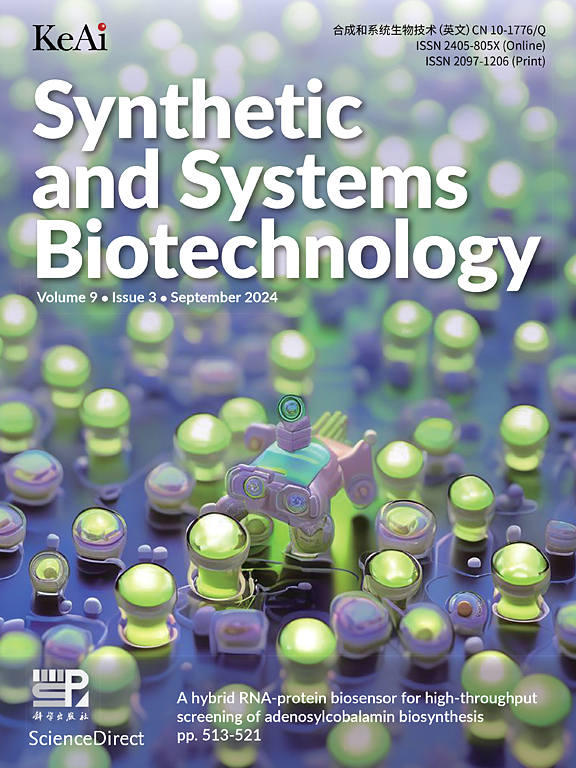在工程大肠杆菌中从头合成 1-苯乙基异喹啉
IF 4.4
2区 生物学
Q1 BIOTECHNOLOGY & APPLIED MICROBIOLOGY
引用次数: 0
摘要
苯乙基异喹啉生物碱(PIAs)是从 1-苯乙基异喹啉前体中提取的具有重要药用价值的天然产品。由于生物合成途径尚未完全阐明,且缺乏为前体强化而设计的合适微生物细胞工厂,因此异源生产 PIAs 仍具有挑战性。在这项工作中,我们在工程大肠杆菌中建立了一条由来自不同物种的八种酶组成的人工途径,用于从头开始合成 1-苯基乙基异喹啉。通过筛选各种依赖 NADP+ 的 2-烯醛还原酶、辅助因子再生和 ChAER1 关键残基的定点突变,优化了中间产物 4-羟基二氢苯甲醛的产量。随后,将改良的多巴胺途径加入内源还原酶缺陷的高酪氨酸产量大肠杆菌中,提高了 1-苯基乙基异喹啉的产量,在 5 升发酵罐中达到 402.58 毫克/升。我们的工作为未来大规模生产高附加值的 1-苯基乙基异喹啉相关生物碱奠定了基础。本文章由计算机程序翻译,如有差异,请以英文原文为准。
De novo synthesis of 1-phenethylisoquinoline in engineered Escherichia coli
Phenylethylisoquinoline alkaloids (PIAs) are medicinally important natural products derived from the 1-phenylethylisoquinoline precursor. Heterologous production of the PIAs remains challenging due to the incomplete elucidation of biosynthetic pathway and the lack of proper microbial cell factory designed for precursor enhancement. In this work, an artificial pathway composed of eight enzymes from different species was established for de novo 1-phenylethylisoquinoline biosynthesis in engineered Escherichia coli. The yield of the intermediate 4-hydroxydihydrocinnamaldehyde was optimized through screening various NADP+-dependent 2-alkenal reductases, cofactor regeneration and the site-directed mutagenesis of key residues in ChAER1. Subsequently, incorporation of the modified dopamine pathway into an endogenous reductase-deficient E. coli with high tyrosine yield boosted the production of 1-phenylethylisoquinoline, reaching 402.58 mg/L in a 5L fermenter. Our work lays a foundation for the future large-scale production of high value-added 1-phenylethylisoquinoline-related alkaloids.
求助全文
通过发布文献求助,成功后即可免费获取论文全文。
去求助
来源期刊

Synthetic and Systems Biotechnology
BIOTECHNOLOGY & APPLIED MICROBIOLOGY-
CiteScore
6.90
自引率
12.50%
发文量
90
审稿时长
67 days
期刊介绍:
Synthetic and Systems Biotechnology aims to promote the communication of original research in synthetic and systems biology, with strong emphasis on applications towards biotechnology. This journal is a quarterly peer-reviewed journal led by Editor-in-Chief Lixin Zhang. The journal publishes high-quality research; focusing on integrative approaches to enable the understanding and design of biological systems, and research to develop the application of systems and synthetic biology to natural systems. This journal will publish Articles, Short notes, Methods, Mini Reviews, Commentary and Conference reviews.
 求助内容:
求助内容: 应助结果提醒方式:
应助结果提醒方式:


